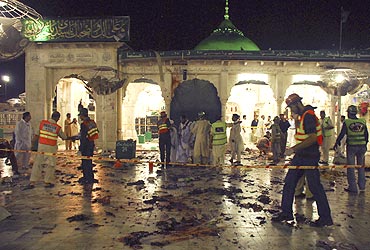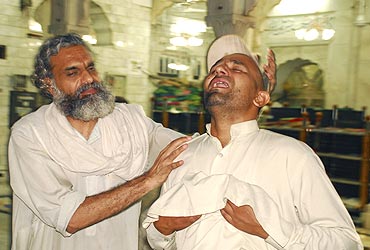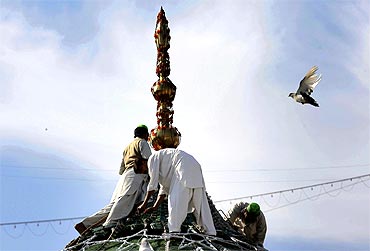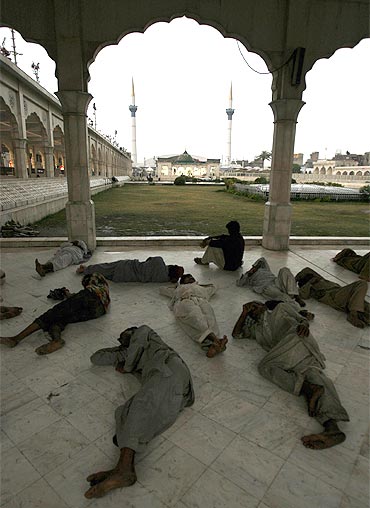Photographs: Reuters
Pakistanis are shocked after the brazen attack on one of their holiest shrines on Thursday, says B Raman
The death of 35 worshippers in twin suicide blasts in a highly venerated Sufi shrine of Lahore, popularly known as Data Darbar, on the night of July 1, has outraged many Pakistanis, who have started wondering whether their government has lost control over terrorists of its own creation and whether Pakistan is imploding due to religious hatred and violence.
Thursday is the congregation day at the shrine when the maximum number of worshippers gather at night (jumaraat). The shrine is considered sacred not only by many Muslim sects -- Shias, Sunnis and Ahmadias -- but also by Hindus. In fact, before Pakistan was created in 1947, a large number of Hindus from all over India used to visit the shrine.
The shrine was, in fact, electrified by a Hindu landlord living nearby in gratitude for the recovery of his sons from a severe attack of flu after doctors had given up hopes for their recovery. The landlord believed that it was the saint, in whose honour the shrine had been built, who came to his house at night and touched his sons who were in their deathbed. They recovered the next day.
Data Darbar is one of the oldest Muslim shrines in the subcontinent. It houses the remains of a Sufi saint, Abul Hassan Ali Hajvery. He was of Persian origin and was born in the 11th century in Ghazni, Afghanistan. From there he migrated to Iraq and spent the last years of his life in Lahore, where he died and was buried.
Jundullah terrorists suspected
Image: Grieving devotees at the Data Darbar shrine after the attackNo organisation has so far claimed responsibility for the suicide blasts, but the needle of suspicion points to the Jundullah group from Iranian Balochistan and the anti-Shia and anti-Iran terror outfit Lashkar-e-Jhangvi in retaliation for the suspected collaboration of the Pakistan government with Iran in the arrest of Abdolmalek Rigi, the amir of the Jundullah. Rigi was captured by Iranian intelligence while he was flying to Kyrgyzstan from Dubai. He was executed in June after a short trial.
The Dawn daily has reported as follows on the suicide blasts:
'In the first terrorist attack of its kind in the Punjab capital, two alleged suicide bombers blew themselves up at the Data Ganj Bakhsh shrine on Thursday night, killing at least 40 people and injuring 170 others. The first explosion took place in the basement reserved for ablutions and the second in front of the shrine's main building where a large number of people from across the province gather for worship on Thursdays.
'Our own people become instruments in the hands of others'
Image: The tomb of Data Durbar, in peaceful timesPhotographs: Mohsin Raza/Reuters
'At first, the police announced that some crackers had exploded near the shrine. The two bombers entered the shrine and exploded themselves three minutes apart. Surveillance cameras, walkthrough gates and metal detectors turned out to be ineffective. Around 100 volunteers and several policemen were present in and around the shrine, searching visitors thoroughly.
'Senior Superintendent of Police (Operations) Chaudhry Shafiq Ahmad told Dawn that two suicide attacks had been carried out and investigators had found the bombers' skulls and limbs. He said ball-bearings and other material used in the blasts had also been collected. Lahore Commissioner Khusro Pervaiz Bakhtiar told journalists at the spot that the bombers had blown themselves up during a large congregation. In reply to a question about the involvement of a foreign hand in the attack, he said the strike was a horrible conspiracy but 'our own people become instruments in the hands of others'.
'The official said an investigation had been launched about the breach in security measures. According to witnesses, the explosions were so powerful that a large number of people fell down and several of them were injured in a stampede. The shrine's administration announced seconds after the first blast that a generator had exploded in the basement and they might continue their activities. The bomb disposal squad estimated that 10-15 kg of explosives had been used in each suicide jacket.
Lahore shrine attack signals Pakistan's implosion
Image: Devotees rest in the Data Darbar compoundPhotographs: Mohsin Raza/Reuters
'Ambulances of Rescue 1122 and the Edhi Foundation took the bodies and injured people to hospitals. According to a devotee, two gates on the north and south side of the shrine, which usually remain closed, were open on Thursday. He suspected that the bombers had entered through those gates.
'Scores of enraged people gathered outside the shrine and protested against the terror attacks. They also damaged public and private property. There were reports that a cracker was exploded before the suicide blasts to create panic.
'Police evacuated Data Darbar to collect evidence and carry out rescue work. All commercial and residential buildings adjoining the shrine were also searched for suspects.
'Following the blasts, an extensive crackdown was launched across the city and several people were detained for interrogation. A suspect was also taken into custody near the Darbar. Rumours of terror attacks on other shrines in the city panicked devotees and police also launched a search operation there. Security was beefed up in and around all shrines and religious places.'





article